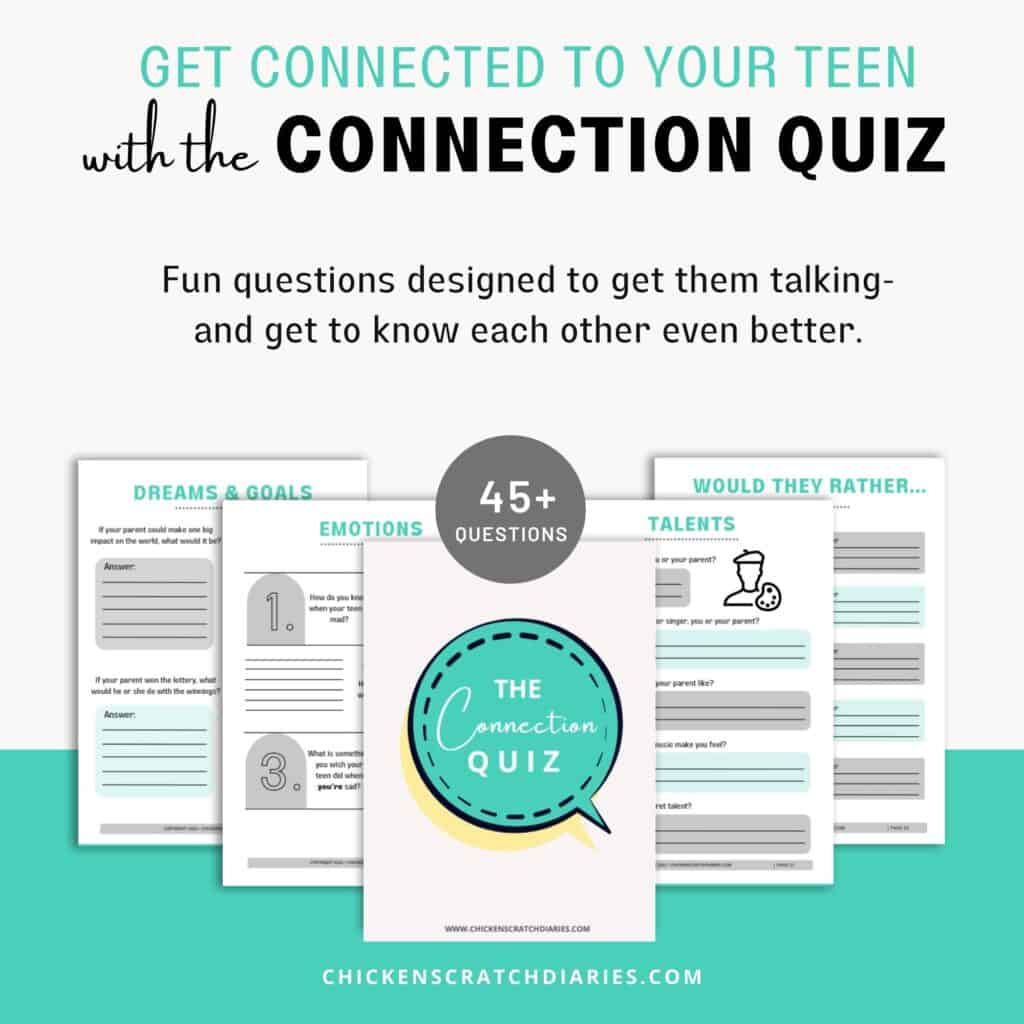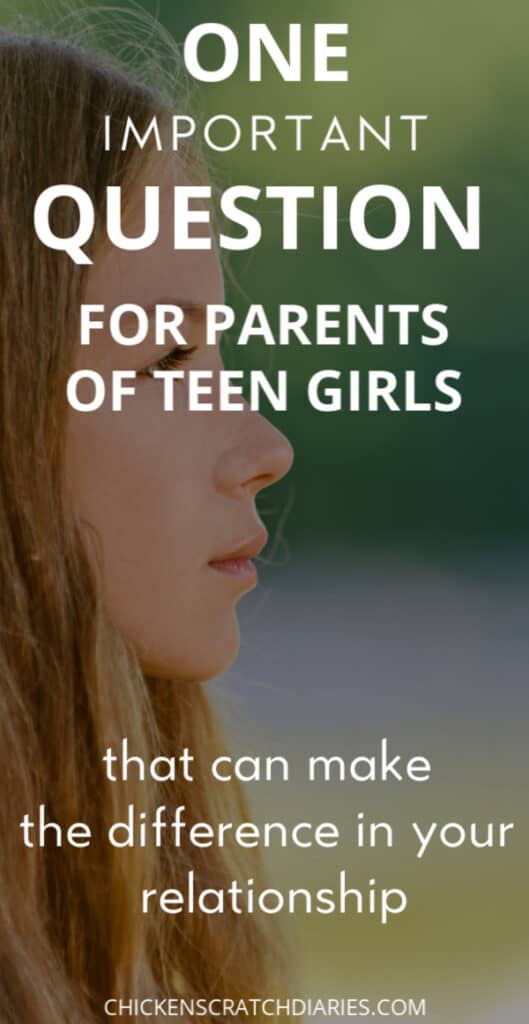
Many parents struggle with the question of how to connect with their teenage daughter. These tips- and one honest question to ask yourself- can be the starting point for a better relationship with your teen.
There’s a subtle change that happens when you have a teenage daughter under your roof.
If you’ve just entered – or exited- the emotional tween years, you’ll have a good preview of what’s coming next.
It didn’t happen overnight. But for me, I felt like once we were officially in the teen years, a chasm slowly started to open between us.
I could sense it in the more-frequent eye rolls, the increasing time spent in her room and in her quick dismissal of my opinions (on just about anything).
It wasn’t every day, or all the time, but it was there. It crept in when I least expected it, and sometimes it hurt.
It was confusing, and I wasn’t sure how to approach these changes.

This post likely contains affiliate links. Please see our disclosure for more info.
From One Mom to Another
There is where I must confess: I’m no teen parenting expert. I’m just a mom in the thick of it, praying my way through.
Devouring the research and good, solid wisdom that can be found on the subject.
Talking to older, wiser, friends who have walked the same path with their daughters and lived to tell about it.
I’ve also worked closely with our local Pregnancy Resource Center where I’ve spent time around many teen girls through the years.
I see the influence of their parents – or lack thereof. I hear the conversations with the moms who are involved in their lives.
And so I observe, and I take a lot of mental notes. And I reflect on my own experiences, and ponder the “nature versus nurture” debate quite often.
My goal is simply to do my best to be intentional in this teen parenting stage, as with every stage.
As my oldest is the official guinea pig (with 3 siblings behind her), I’ve already made plenty of mistakes.
And just as we tell our kids, it’s not productive to dwell on the mistakes but to learn from them.

Truth be told- I’ve been blessed with a pretty exceptional kid to learn from. But none of us- not one- is immune to the changes that inevitably come as our kids inch closer to leaving the nest.
A Question and a Turning Point
As I was thinking on some recent challenging moments I’ve had with my daughter, the Lord brought a question to my attention one day, and it’s been stuck in my head ever since:
In my efforts to connect with my daughter, am I building bridges, or building walls?
Below are just a few areas where this concept is so relevant.
I think once it gets into your head too, you’ll see how powerful bridges vs. walls can be in improving our relationship with our teens.
Building Bridges with Words
Whether we realize it or not, when it comes to our words, we’re either in the construction or deconstruction business.
We teach our kids that words can “build up or tear down”, but I know I’ve been negligent with my own words too many times to count.
It seems the older my kids get, the more temptation there is to argue and drop blunt “truth-bombs” in their lap in order to get their attention.
Practically, I know that telling the truth in love is what God really wants from me in dealing with anyone, including my kids.
This motivates me to re-think some recent conversations in our home.
Here are some examples of building bridges instead of walls with words:
Music tastes
I walk into the kitchen and Alexa is blaring an unintelligible song that my teen is obsessed with. I can either say something like:
“I don’t understand why you like that music! It’s so loud! Take it to your room or wear headphones. I don’t want to hear it.”
Or:
“That’s interesting. Who sings it? What do you like about it?”
The first example builds a wall. I’ve already expressed my disdain for her preference and suggested I’d rather her go away then be subjected to her preference.
The second example lends to understanding. If I show some genuine interest in what she’s interested in, she might just tell me all about it.
Then, hopefully, we can have a discussion.

We might not leave the discussion agreeing that we both like it – but a bridge might be built.
Her opinions have been expressed, and she’s been given a chance to articulate her preferences. And let’s be honest, teen preferences are often short-lived!
Preferences versus value judgments
Now in the above example, if I walked into the kitchen and the music blaring was full of obscenities and sexual innuendo — this would be the time to place a value judgment on the content.
In this case, it’s not about accepting a preference, it’s about setting boundaries on negative influences into her life. (And that of her siblings.)
The same type of open-ended questions could foster understanding, however.
For example:
“Woah, did you catch that? Let’s talk about this for a second. Pull up a chair.”
versus:
“TURN THAT OFF NOW. That’s it, I’m taking away Alexa and your phone and you’re never listening to that trash again!”
While the second statement might be true, it’s not going to get my daughter to understand what I hope to communicate that I love her too much to allow that music to influence her.

Clothing preferences
When addressing my teen’s choice of outfit, I could say something like:
“Those pants look terrible. They look like pajama pants! Can’t you find something appropriate to wear to school?? I know you have better clothes than that; why won’t you wear them?”
Or:
“You like those pants a lot don’t you? What other types of pants should we look for the next time we go shopping?”
Truth time:
The first response was the exact conversation we had recently before school, and I knew it was the wrong thing to say as soon as I said it. First of all, I had let her buy the pants with her own money. She was proud of them.
No, I didn’t realize they would become her favorite pants for school and in my opinion they’re a little sloppy, but – it’s just my preference, right?
I’m sure we ALL can look back on something we wore in 8th grade and cringe. I won’t deny her the privilege. 😉
But seriously, the second response would have been a better choice – or saying nothing at all.
We could have talked about why she liked the pants (her view) and maybe found some common ground. We might continue to disagree over sweatpants versus jeans, versus leggings.
But the main thing is that within the boundaries of what I consider appropriate, I need to give her a little freedom to make her own choices (and live with them).
Choosing friends/dating
When it comes to the people our kids are influenced by, this is perhaps the hardest thing: Knowing what to say, and when and how.
Here’s a hypothetical example:
My teen invites a friend over after school. I pick up on some things that are concerning – behaviors, attitudes or other red flags, with this friend.
Later on, I could say something like:
“Well, she is definitely not welcome back here again. What were you thinking? She must not have a very good home life. I can’t believe she said/did (fill in the blank).”
Or:
“Did you enjoy having ______ over? (Point out a positive characteristic here – she’s friendly, she seems outgoing, etc.)
What do you two have in common? (Listen closely here!). There were a few things that concerned me. (Insert concerns here.) What do you think about that?”
Notice: I’m not trying to bait-and-switch here. I still have to be honest – because that’s the loving thing to do, but again, truth in love.
Remember the grace we all need
We don’t have to throw out the baby with the bathwater, and we can and must show grace.
This is especially a concern when we’re talking about another child (who may be facing a lot more than we realize). I certainly hope other parents would show the same kindness to my child.
But by using gentle questions and getting our teen’s feedback, we can see relationships from their perspective.
Is it just a friendship of convenience? Maybe they have lunch together and bonded over a shared love of Cheetos.
Or does she truly think there is nothing wrong with whatever the concerning behaviors might be?
These need to be ongoing conversations. We want to build bridges that last.
It doesn’t take long to have a teen before you realize that going into defensive mode about their choices in friends can quickly backfire, and escalate a relationship that really had a weak bond to begin with, and would have otherwise fizzled.

If this is truly a toxic, harmful relationship that has already escalated, in my view this is a different scenario. Setting firm boundaries (not allowing time together) must then happen to protect your child.
Some external walls are necessary.
It’s the internal walls within our home that we want to avoid.
Homework
Homework struggles are another area that can create a lot of stress in our relationships with our kids.
Sometimes we inadvertently build walls, when homework isn’t completed on time.
We say things like:
“Why isn’t your homework done? Don’t tell me you don’t know how to do it – you sat in class and heard the instructions, didn’t you? Get it done now!”
And while those things might be true, up goes the walls, and our kids’ defense mechanisms.
So it might be better instead to say:
“It seems like you’re struggling with getting your homework completed. Do you know why that is?
I want to make sure you have plenty of time to rest and be at your best tomorrow. So let’s figure out a plan to get on a better homework schedule.”
We all want to teach our kids responsibility, and that is what usually causes so much frustration around the homework issue.
But again, bridges versus walls: how can we communicate our expectations while finding a solution to the problem?
Asking good questions and letting them know we care is a good place to start.
Building Bridges with our Actions
Lately I’ve been brainstorming some intentional actions that I can also take to connect with my teen.
Remember, our goal isn’t to build a one-way bridge.
This isn’t about you learning to speak teen lingo and copying the latest TikTok dance in order to “relate”.
It’s also not about thinking we can get our teens over to “our side” on every issue.
Although it’s our nature to want to make our kids think like us and adopt our point of view – we should actually be glad that as they grow, they are gaining preferences and perspective.
This is something they’ll need to continue to develop.
And, this is how they learn to make sound judgments – weighing the opinion of others and deciding what’s really true and what they really believe.
The intentional types of actions that I think can help foster this two-way bridge of understanding:
1| Being available
Our kids might want more independence, but they still need time with us.
We can’t influence them in positive ways if we’re too busy to listen, encourage, and occasionally even offer advice. 😉
I’ve had to learn to go seek out my teen when she’s out of sight for very long.
It’s important to see what she’s up to and just hang out with her. She may not always appreciate it, but most of the time she does.
Everyone wants to be wanted. Teens are no exception.
2| Planning activities
I’ll admit right here and now that I’m the World’s Least Fun Mom.
It takes WORK for me to sit and think and plan out things that my teen might actually enjoy doing with me.
So I have to not only be available in the common spaces we share at home, but also carve out time to go places and sacrifice my time doing other things, to be with her.
It doesn’t have to be frequent outings. It doesn’t need to cost money every time.
But even sneaking out to get ice cream together after the younger kids have gone to bed can go a long way in strengthening our relationship.

3| Working together
Lastly, one of the best things we can do for our teens that ALSO gives us bridge-building opportunities is to involve them in meaningful work.
Yeah, I’m talking chores, but not just individual activities.
Working alongside each other is how families pass down valuable skills, but also values, history – and our hearts.
I’m learning to do dishes WITH my daughter even when it’s her assigned chore (that’s supposed to save me time!), as often as I can.
While I’m doing that, we might talk, but we’re working together. She sees me caring enough to share the load, even when I don’t have to.
Forward-thinking actions
As my teen grows, I want to give her more responsibility to do the “fun” things too.
For instance: planning the meals for the week and writing the grocery list.
I hope to engage her in my home business with some paid tasks that she looks forward to helping with. It’s a win-win for the both of us, and it’s time better spent than consuming media.
Sometimes we overlook the things our teens can contribute to the family. At least – I know that I do.
But far too soon she’ll be on her own, and I want to know that I invested in her by teaching her things that will serve her well.
Cliff notes to bridge building
If I had to sum up how I hope to build bridges and not walls with my teen (and the next 3 after her), these would be at the top of my list:
- Affirming words = bridge building.
- Defensive, angry words = wall building.
- It only takes a second to choose to re-frame a question – or hold our tongues.
- Honesty is key. Truth breeds credibility.
- Teens are old enough to know when you’re not genuine or you’re trying too hard to “relate” at their level.
- You don’t need to be cool to gain their respect.
- Seek out their company. Don’t neglect family traditions and don’t assume they don’t want to participate.
- Bedtime is still a great time to connect and pray together.
- Be available. They may not always want to talk, but they shouldn’t have to compete for our attention either.
- Be gracious. Remember they are still growing, brains are still developing.
- Just like you and me, they are going to make mistakes.
- Set boundaries/enforce consequences, but forgive quickly.
- Keep talking. Even when you know the response won’t be good initially, keep saying the things that need to be said.
- They will keep coming to you when they know nothing is off-the-table for conversation.
- Don’t get sucked into the vortex of their emotions.
- Keeping our head above those waters is one of the most important things we can do to maintain peace and stability in our homes.
- Don’t take things personally that they say and do.
- Choose your battles wisely.
The lasting impact of bridge-building
Keep in mind:
The concept of “bridges” is simply about seeking understanding and the ability to reach out from both ends of the bridge.
But you’re going to have to be the one to initiate the process. Because even though they want the connection, they don’t always know how.
They won’t have the master blueprint in mind – that’s your job.

Remembering our own fragile years
Also: It’s been a while since we’ve been on their end, and it can be hard to put ourselves in their shoes, but we must try.
In contrast, our teens have never been where we’re standing.
They lack the life experience and the ability to apply wisdom appropriately to every decision they face. We have to help them grow into wisdom.
What I’m learning is that this is a critical time in their development. In fact, it’s just as critical as when they were babies and learning to walk and talk.
Our teen daughters need us now as much as they ever have.
With our time, and with careful words and conscious effort, we can reach across the gap.
We can continue to strengthen those bridges that will carry them into adulthood, and launch them into a world where capable builders are always needed.
You might also like:
Take the Connection Quiz: Get to know your teen even better!
The Tumultuous Tween Years and Guide to Girl Drama
Preparing for Your Child Leaving for College: 3 Tips for Moms
To my Children: Don’t Become the Best Version of Yourself
Staying Kingdom-Focused in a Selfie-Saturated World


Knowing yourself well includes knowing the things you lack and never received or continue to not receive from your family. I wish my parents had this level of emotional maturity because my younger sister and I could have used it more growing up. I feel burdened to be the emotionally-mature parent my sister never had, but that is hard when I am still young myself.
Thank you for your wise words..
That’s hard, Nicole. I hear you. It is definitely important to recognize those things so we don’t seek our emotional needs in unhealthy ways, from other unhealthy people. You sound like a wonderful big sister. Forgiveness is also important and necessary for healing. I have to remind myself to not to look to people for things that only God can give, because he’s the only one who can satisfy our deepest needs.
Good tips for the future with my girls ❤️ It’s hard for me to have compassion when my kids are making bad choices when I know they know better. That’s sure to be more difficult into the teenage years. Thanks for sharing some positive ways to build bridges.
That’s so true, Suzanne. We want to see them make good choices and avoid painful consequences, but sometimes just being there for them through the choices- good and bad- is the best thing we can do (hello, free will! 😉 ) Thanks for reading!
Thank you for this article. My only child (daughter) just turned 13 in May and I felt as if you wrote about us! I am sensing a divide beginning to develop and I don’t care for it. But until finding this article, I just haven’t figured out how to change my parenting tactics to develop our relationship (versus damaging it). Thank you for your complete honesty. Now I just pray the Lord gives me the ability to hold my tongue and think about your question before I speak. Not my strong suit.
Holding my tongue is not my strong suit either- but God is good to give us what we need when we ask him!
Very great article! I’m rebuilding my relationship with my daughter while learning who she’s becoming. I’ve started some of these approaches before reading and can’t wait to practice the others you shared. It truly takes a village to raise children. Thank you for sharing your jewels and wisdom!
How wonderful for new beginnings!